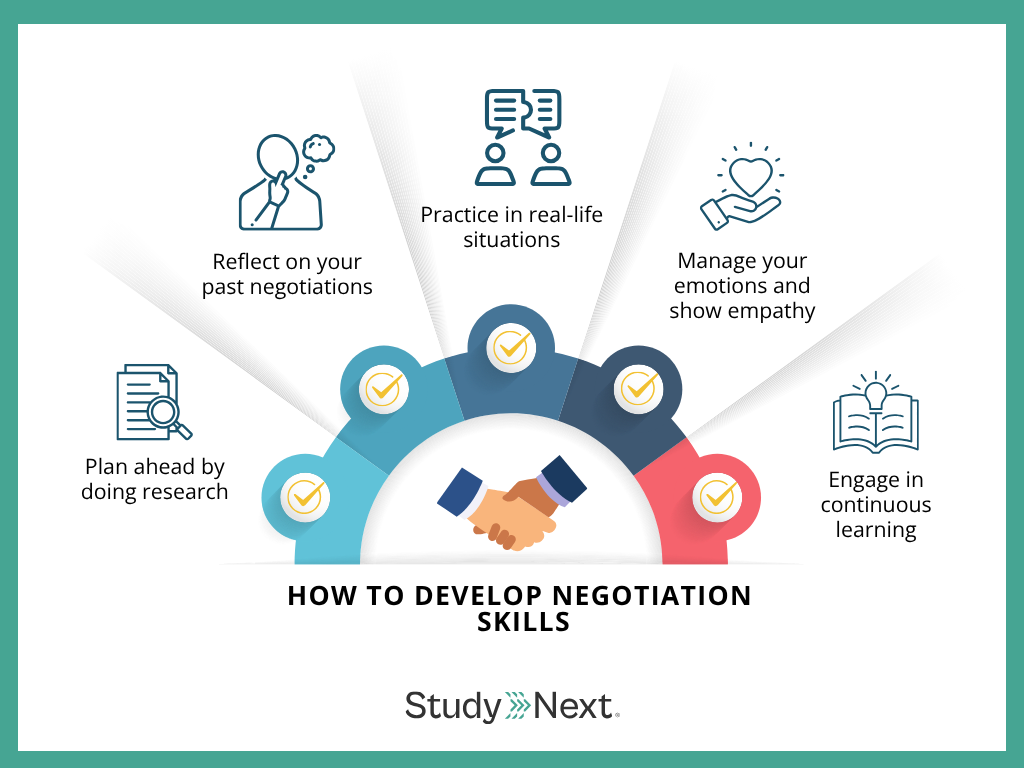
Whether you’re closing a business deal, resolving workplace conflicts or advocating for better career prospects, negotiation is a crucial skill that can support your professional success. If you’re looking to enhance your negotiation skills, enrolling in a course can offer you the structured learning and guidance you may need.
In this article, we explore a range of courses designed to help you become a better negotiator. We also cover practical ways to build your negotiation skills and explain why they’re important in the workplace.
12 courses to boost your negotiation skills
If you're planning to further your studies, look for courses that focus on negotiation or offer a unit dedicated to developing negotiation skills. Since negotiation is valuable across many industries, you’ll find it included in a wide range of disciplines. This gives you the opportunity to enhance your negotiating skills while furthering your qualifications in your desired field.
Here are some courses you can explore:
Negotiation and Influence for Success
This negotiation skills course at CPA Australia targets finance professionals like finance managers, auditors and management accountants.
Why study this course?
The Negotiation and Influence for Success short course delves into conflict management and strategies for influencing others. It also explores the essential steps of the negotiation process and techniques for cross-cultural negotiations.
Delivery mode: Online
Duration: Four hours
Total fee (2025): $519.75


CPA Australia’s Micro-Credentials are based on technical and non-technical competencies and align with the Accounting and Finance Capability Framework. The university's partner, Credly, will provide you with a digital badge to complete the assessment. Your digital badge demonstrates your capability and achievement and can be placed on your LinkedIn profile, digital CV or email signature.
About Negotiation and Influence for Success
Negotiation skills can be widely applied to many aspects of work life, including stakeholder management, business partnering, team management and establishing a personal brand. Influence is a subtle art fundamental to other key skills that finance professionals need to possess to thrive in their careers.
Master of Business
In this master’s course at Griffith University, you can take on Negotiation Strategy and Skill as an elective to help you navigate various types of negotiations effectively.
Why study this course?
Throughout the Negotiation Strategy and Skill unit, you’ll gain knowledge of core negotiation concepts, including strategy and tactics, communication and decision-making, negotiation planning and analysis, and power, ethics and social responsibility.
Delivery mode: Face to face
Duration: 24 months
Indicative annual fee (2025): $32,500 (domestic full-fee paying place)


The Master of Business is a program designed for professionals aspiring to transition into management roles, for current managers seeking formal qualifications and for those looking to change careers. This degree is designed to help you master essential business concepts and provide you with the frameworks and creative problem-solving skills to enable you to operate effectively in the dynamic, global business economy.
This program will help you to develop your business and management skills further, build specialist knowledge within your chosen area and accelerate your career.
Depending on your career aspirations and interests, you can complete majors in the following areas:
- Accounting [Brisbane South (Nathan), Online]
- Business Analytics [Brisbane South (Nathan), Online]
- Event Management [Gold Coast, Online]
- Human Resource Management [Brisbane South (Nathan), Gold Coast, Online]
- Information Systems and Digital Business [Brisbane South (Nathan), Online]
- International Business [Brisbane South (Nathan), Online]
- International Tourism and Hospitality Management [Gold Coast, Online]
- Management [Brisbane South (Nathan), Online]
- Marketing (Brisbane South [Nathan], Gold Coast, Online]
- Political Science and International Relations [Brisbane South (Nathan), Online]
- Sport Management [Gold Coast, Online]
- Supply Chain Management [Brisbane South (Nathan), Online].
This program includes a dissertation pathway. The dissertation pathway can provide a path to a higher degree by research for candidates with the qualifying Grade Point Average (GPA).
Master of Digital Marketing
The University of Melbourne offers Conflict and Negotiation as an elective in this course, focusing on conflict management issues in the workplace.
Why study this course?
You’ll learn to identify and differentiate between various types of conflict that happen both within and between organisations. The Conflict and Negotiation elective also provides practical experience, as you’ll be given the opportunity to apply negotiation techniques through case studies and interactive simulations.
Delivery mode: Face to face
Duration: 18 months
Indicative annual fee (2025): $36,992 (domestic full-fee paying place)


Become a digital marketing expert
Navigate the fast-paced world of digital marketing with a Master of Digital Marketing at Melbourne University. Develop specialised knowledge and skills through a suite of advanced subjects. Gain hands-on experience with leading companies and explore how digital marketing theories apply in real-world business contexts. Graduate with in-demand skills, ready to step into this exciting and ever-changing profession.
Key Features
- Build digital marketing skills and knowledge. Develop expertise in social media marketing, channel management, content marketing, retail, metrics and analytics.
- Road test your new skills in the industry. Develop job-ready skills and build your professional networks with an industry internship in your area of interest.
- Learn from industry experts. Explore best-practice examples from industry thought leaders and learn from case studies presented by marketing professionals.
Master of Entrepreneurship and Innovation
As part of your studies at the University of Queensland, you can take Business Negotiation as an elective. This unit offers an introduction to negotiation and conflict management across business, personal and societal contexts.
Why study this course?
You’ll be able to critically assess your own negotiation style and develop stronger skills in business negotiation. The Business Negotiation unit also explores ethical and cultural aspects of negotiation in a business context.
Delivery mode: Face to face
Duration: 18 months
Indicative annual fee (2025): $38,480 (domestic full-fee paying place)


The Master of Entrepreneurship and Innovation will teach you about understanding the role of entrepreneurship and innovation in modern business and the benefits they create, including better communities.
Upon graduation, you'll have a globally recognised qualification that's highly regarded by employers and gives you the skills to encourage innovation and entrepreneurship within any organisation, from a corporation, startup or research organisation to the public sector.
Master of Commerce
This course at the University of Sydney features a Business Negotiations elective, designed to build your confidence in negotiation.
Why study this course?
Throughout the Business Negotiations unit, you’ll participate in simulated negotiations, engage in debriefs, attend problem-solving workshops and examine global negotiation case studies. You’ll also learn how to develop your own negotiation strategies by integrating economic, legal and psychological concepts covered in the unit.
Delivery mode: Face to face
Duration: 24 months
Indicative annual fee (2025): $39,100 (domestic full-fee paying place)


The Master of Commerce is a postgraduate coursework degree that will give you a thorough understanding of commerce for use in various fields to assist you to pursue a career in business. It is designed for students with prior business or management qualifications seeking to build on their existing expertise.
Master of Global Business
In this course at Monash University, you’ll take Intercultural Communication and Negotiation as a core unit, which aims to improve your communication skills in negotiation within intercultural settings.
Why study this course?
You’ll explore how national culture influences values, behaviour, identity and communication, especially in intercultural business negotiations. The Intercultural Communication and Negotiation unit also examines how worldview, politics and ethics affect the way people act during negotiations, and teaches you how to navigate these complexities.
Delivery mode: Face to face
Duration: 18 months
Indicative annual fee (2025): $37,100 (domestic full-fee paying place)


The more we move into the future, the more intertwined the international business landscape becomes. Driving positive and sustainable progress for organisations and people alike takes a deeper understanding of the economic, political and social forces at play in the world of business – as well as a clearer perspective on how to use your insights and experience to respond to these forces.
This multidisciplinary master's program builds your awareness of the global business environment, while progressing your practical expertise as well.
In as little as one year, you’ll have developed a greater awareness for the global context – and how this context impacts business, strategy, government, diplomacy, trade, sustainability, social responsibility, intercultural communication and more.
Complementing this deeper understanding of cross-regional, cross-cultural challenges and opportunities is an altogether stronger business skillset. The program elevates your ability to think critically, solve innovatively and impact sustainably. So by the time you’ve completed your study, you’ll be ready to find practical ways forward to complement your understanding.
Flexibility is a key component of the program – and you can choose to hone in your focus on specific areas of study, or take part in a broader set of electives. Whichever path you choose, one thing’s certain. You’ll have equipped yourself with the knowledge – and practical know-how – to influence positive change to the world of business in a global scale. While taking your career in exciting new directions too.
Master of Professional Accounting
The University of South Australia includes a Negotiation elective in this course, where you’ll learn how to identify, understand and evaluate key issues in negotiation processes.
Why study this course?
You’ll learn how to develop practical strategies for effective negotiation while gaining a strong understanding of different negotiator approaches. The Negotiation unit aims to help build your confidence and sharpen your negotiation expertise.
Delivery mode: Face to face
Duration: 24 months
Indicative annual fee (2025): $34,200 (domestic full-fee paying place)


The Master of Professional Accounting will prepare you for practice as a professional accountant. You will develop analytical, general business management and critical problem-solving skills, and gain a comprehensive understanding of accounting practice.
Your studies will focus on financial and management accounting, finance, commercial law, taxation law and auditing. You’ll study contemporary research and real-life case studies with the opportunity to complete an industry placement in Australia or overseas. You will graduate well-equipped for a global career and knowledgeable in areas such as accounting, tax, financial management and public practice.
Master of Human Resource Management
One of the core units in this course at the University of Newcastle is Negotiation and Conflict Resolution, which examines the nature of conflict in the workplace from diverse theoretical and applied perspectives.
Why study this course?
You’ll learn key resolution methods such as negotiation, mediation and advocacy. Using a problem-based learning approach, the Negotiation and Conflict Resolution unit emphasises the importance of strong communication skills as a foundation for resolving conflicts effectively.
Delivery mode: Online
Duration: 18 months
Indicative annual fee (2025): $31,420 (domestic full-fee paying place)


The Master of Human Resource Management prepares graduates with strong business analysis and managerial decision-making skills in addressing HRM and ER issues. The curriculum is uniquely balanced to provide practical components with sound theory and participant-focused learning approaches.
Students have the opportunity to develop a skill set that is relevant to Australian and global workplaces, positioning them with a range of career options for their next career move. This program is designed for students with little or no background in the discipline or those wishing to upgrade their existing knowledge in the field.
AGSM Master of Business Administration
At the University of New South Wales, you can take Negotiation Skills as an elective in this course, which delves into the dynamics of negotiation processes.
Why study this course?
The Negotiation Skills elective unit encourages you to reflect on and assess your own negotiation behaviours. Some of the topics you’ll learn include power and influence, intercultural negotiation and the effects of third parties. You’ll be able to hone your skills by engaging in role-play simulations and reflecting on their outcomes.
Delivery mode: Face to face
Duration: 12 months
Indicative annual fee (2025): $84,500 (domestic full-fee paying place)


The AGSM Master of Business Administration (MBA) is a full-time, accelerated degree designed to prepare students for senior leadership roles across the private, public and not-for-profit sectors. Expand your skill set for the future through active learning experiences while unlocking the practical tools you’ll need to thrive in your professional endeavours.
Gain insights from renowned academics and industry leaders in the corporate, government, and not-for-profit sectors. Through their teachings of contemporary foundational and elective courses, your studies will focus on strategy, finance and marketing, innovation, entrepreneurship, digital transformation, technology and social impact.
Master of International Management
This course at the University of Adelaide offers a Cross-Cultural Management and Negotiation unit, focusing on how cultural differences influence organisational behaviour and negotiation in a global context.
Why study this course?
You’ll develop practical skills in cross-cultural communication and negotiation skills to solve challenges in a multicultural environment. The Cross-Cultural Management and Negotiation unit covers topics such as leadership and decision-making across cultures, understanding organisational culture as well as managing multicultural teams and culturally diverse organisations. It also includes practical learning through case studies, simulations and scenario-based discussions.
Delivery mode: Face to face
Duration: 24 months
Indicative annual fee (2025): $41,000 (domestic full-fee paying place)


International business managers help different types of organisations to benefit from the complex and dynamic forces of globalisation.
The University of Adelaide takes a practical approach to equip students from all around the world with the skills needed to manage these complexities and impact the international market.
Learn to spot and seize international business opportunities, get the best out of the culturally diverse workforce, negotiate across cultures and deliver value to different types of organisations. Benefit from diverse cohorts and small class environments, build advanced business, communication and leadership skills, and expand your cultural awareness.
Master of Marketing Management
As a student of this course at the University of Canberra, you’ll take the Negotiation and Sales Management unit as part of your studies, which explores the theoretical foundations of negotiation and sales management.
Why study this course?
The Negotiation and Sales Management unit includes negotiation simulations and sales force planning exercises, helping you improve your interpersonal and communication skills. You’ll also evaluate diverse negotiation and sales strategies while reflecting on your personal strengths and areas for improvement as a negotiator.
Delivery mode: Face to face
Duration: 24 months
Indicative annual fee (2025): $30,900 (domestic full-fee paying place)


Cultivate collaboration, innovation and critical thinking with UC’s Master of Marketing Management.
Through a combination of functional coursework, interactive discussions, case studies and hands-on projects, you will gain a comprehensive understanding of marketing strategies, consumer insights, market research techniques and effective management practices. Across the course, you’ll be equipped with the expertise and confidence to take on challenging marketing roles in various industries, ranging from multinational corporations to entrepreneurial ventures.
Whether your aspirations lie in brand management, digital marketing, market research or strategic marketing, the Master of Marketing Management will empower you to make a significant impact in your organisation and excel in your marketing career.
Study a Master of Marketing Management at UC and you will:
- Develop the ability to create effective marketing strategies that align with organisational goals.
- Gain insights into consumer motivations, preferences and decision-making processes.
- Explore social media marketing, search engine optimisation (seo) and content marketing, as well as virtual reality platforms that are used in digital marketing.
- Evaluate the economic and policy environment of australian and international markets and how they affect business management.
- Use creativity, critical thinking, analysis and research skills to provide practical solutions to marketing problems.
- Increase your understanding of global markets, cross-cultural considerations and strategies for expanding into international markets.
Master of Project Management
One of the electives offered in this Charles Sturt University course is Negotiation Skills, which explores a wide range of negotiation styles, along with their strengths and weaknesses.
Why study this course?
The Negotiation Skills elective helps you determine which approach is best suited to different negotiation scenarios. You'll reflect on the critical perspectives on these styles and apply what you’ve learned through role-play exercises.
Delivery mode: Online
Duration: 18 months
Indicative annual fee (2025): $32,400 (domestic full-fee paying fee)


Become a business leader with the skills to successfully manage complex projects. Designed for professionals from diverse backgrounds, the Master of Project Management from Charles Sturt University provides preparation for a range of project management certifications, such as those offered through the Project Management Institute (PMI)®. From the Graduate Certificate in Project Management through to the master's program, Charles Sturt University has an option to suit you. Charles Sturt University and IT Masters are offering six intakes so you can choose when to start your studies. Choose a session or term starting January, March, May, July, August or November, and kickstart your IT career. To find out more about how Charles Sturt University's six intake term and session structure works, visit the IT Masters website.
What are negotiation skills?
Negotiation skills are the abilities used to reach a mutually beneficial agreement between two or more parties. These skills typically include communication, persuasion, active listening and problem-solving. You also need to have a collaborative mindset and a willingness to compromise, as negotiation processes are often about navigating conflicting interests, managing emotions and maintaining positive relationships. Strong negotiation skills help build trust and create long-term value in both personal and professional interactions.

How to develop negotiation skills
You can develop your negotiation skills by performing research ahead of negotiations and reflecting on past experiences to identify areas for improvement. Actively applying negotiation techniques in everyday situations, being in tune with emotions during negotiations and engaging in continuous learning can also help you become a better negotiator.
Learn more below:
-
Plan ahead by doing research
Before entering a negotiation, performing thorough research can help you be more prepared to negotiate terms that are beneficial for you or your company. The insights you gather can help you make a stronger case, anticipate the other party’s arguments and counter them effectively. Being well-prepared enables you to define your goals clearly and establish how you can achieve them through negotiation. It also helps you determine what your minimum acceptable terms are and what you’re willing to walk away with if the negotiation doesn’t go your way. -
Reflect on your past negotiations
Being self-aware of your strengths and weaknesses as a negotiator can help you improve your skills. After a negotiation, reflect on how it went and if you managed to reach your desired outcome. If you failed to get the results you want, examine your approach and determine what challenges you faced. Considering what you could have done differently can also help you be more prepared for future negotiations. -
Practice in real-life situations
You can enhance your negotiating skills by practising in familiar and low-risk settings. For example, you may try negotiating for a better discount when shopping at a local market. This can help you improve your persuasion skills and assertiveness. You may also practise during group discussions, such as deciding where to have dinner with friends or family. In this setting, you’ll need to take in other people’s opinions, give your own preference and find a common ground for everyone. This process can improve your skills in active listening, empathy and problem-solving.When you regularly apply negotiating techniques in these everyday situations, you’ll gain confidence to negotiate in environments with higher stakes, such as business deals and client meetings.
-
Manage your emotions and show empathy
Being aware of your emotions and others’ feelings can help keep negotiations respectful and productive. Negotiations can be emotionally charged, as all parties want to have their perspective understood. This can cloud judgment, affect decision-making and influence outcomes.By listening attentively to the other party’s needs and practicing empathy during a negotiation, you can understand their point of view better and respond more constructively, while finding a solution that you both can agree on. Managing your own emotions is also important. If you feel anxious or overwhelmed, you can try regulating your emotions by taking deep breaths or briefly stepping away to keep yourself calm and level-headed.
-
Engage in continuous learning
Embracing lifelong learning and actively upskilling can help boost your negotiation abilities. You can do this by participating in negotiation skills training through workshops and seminars, seeking guidance from experienced mentors or furthering your qualifications. Many courses across diverse disciplines include a negotiation-related unit in their curriculum to equip students with practical skills and techniques to manage negotiations in various business settings.These upskilling efforts can develop core negotiation competencies, such as communication, adaptability and conflict resolution. Continuous learning also encourages critical thinking and creative problem-solving, which are essential skills for navigating complex negotiations.
Why business professionals need negotiation skills
Negotiation skills are essential for business professionals as they help them achieve favourable outcomes in the workplace, such as closing business deals, enhancing leadership skills, driving organisational change and improving career prospects. Effective negotiation can also contribute to a positive workplace culture and resolve conflicts. Find out how below:
- Secure business deals: As a strong negotiator, you can build rapport with clients and potential partners in business discussions. By persuading them with compelling proposals that create value for all parties, you can increase your chances of closing business deals successfully and establishing long-term professional relationships. Effective negotiation skills also help maintain strong relationships with existing key stakeholders like partners and suppliers.
- Boost leadership capabilities: Leaders at work are often engaged in negotiations in various business matters like project timelines and resource allocations. You need negotiation skills to advocate for your team’s needs while staying aligned with overall organisational goals. By securing favourable terms, you can better support your team and enhance overall business performance.
- Support organisational innovation: Suggesting changes to innovate business operations can often be met with resistance from stakeholders, especially if they feel their interests are threatened. Being a strong negotiator allows you to address their concerns and persuade them to embrace innovation that can help the organisation stay competitive.
- Improve career prospects: Throughout your career, you’ll likely negotiate for a higher salary, better work hours or other professional opportunities that support your growth. Strong negotiation skills are essential for navigating these discussions to secure your desired outcomes and help you go further in your career.
- Build a positive workplace culture: Effective workplace negotiation depends on respectful communication and teamwork. When employees feel heard and valued during discussions, it helps create a supportive and positive work environment. This sense of inclusion and empowerment can boost morale and productivity, as people are more motivated to collaborate and pursue shared goals.
- Resolve conflicts: Conflict resolution and negotiation skills promote open communication among all parties involved, which can reduce misunderstandings and prevent conflicts from escalating. This can make it easier to navigate disagreements at work as everyone works on finding mutually beneficial solutions in a respectful manner.
Negotiate your way towards success
As a business professional, strong negotiation skills can help you get further in your career. There are plenty of ways to develop these skills, including regular practice, reflection and continuous learning. Recognising its importance, many postgraduate courses include negotiation as part of their units to prepare you for complex business discussions. Thinking of furthering your studies? Explore a range of postgraduate business courses available in Australia today.






















